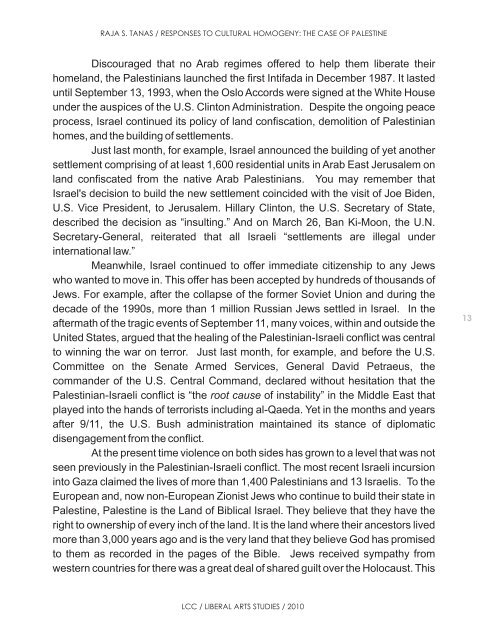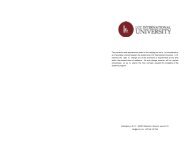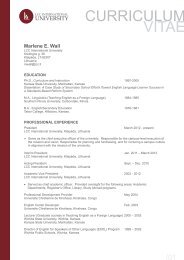lcc liberal arts studies / 2010 volume iii - LCC International University
lcc liberal arts studies / 2010 volume iii - LCC International University
lcc liberal arts studies / 2010 volume iii - LCC International University
Create successful ePaper yourself
Turn your PDF publications into a flip-book with our unique Google optimized e-Paper software.
RAJA S. TANAS / RESPONSES TO CULTURAL HOMOGENY: THE CASE OF PALESTINE<br />
Discouraged that no Arab regimes offered to help them liberate their<br />
homeland, the Palestinians launched the first Intifada in December 1987. It lasted<br />
until September 13, 1993, when the Oslo Accords were signed at the White House<br />
under the auspices of the U.S. Clinton Administration. Despite the ongoing peace<br />
process, Israel continued its policy of land confiscation, demolition of Palestinian<br />
homes, and the building of settlements.<br />
Just last month, for example, Israel announced the building of yet another<br />
settlement comprising of at least 1,600 residential units in Arab East Jerusalem on<br />
land confiscated from the native Arab Palestinians. You may remember that<br />
Israel's decision to build the new settlement coincided with the visit of Joe Biden,<br />
U.S. Vice President, to Jerusalem. Hillary Clinton, the U.S. Secretary of State,<br />
described the decision as “insulting.” And on March 26, Ban Ki-Moon, the U.N.<br />
Secretary-General, reiterated that all Israeli “settlements are illegal under<br />
international law.”<br />
Meanwhile, Israel continued to offer immediate citizenship to any Jews<br />
who wanted to move in. This offer has been accepted by hundreds of thousands of<br />
Jews. For example, after the collapse of the former Soviet Union and during the<br />
decade of the 1990s, more than 1 million Russian Jews settled in Israel. In the<br />
aftermath of the tragic events of September 11, many voices, within and outside the<br />
United States, argued that the healing of the Palestinian-Israeli conflict was central<br />
to winning the war on terror. Just last month, for example, and before the U.S.<br />
Committee on the Senate Armed Services, General David Petraeus, the<br />
commander of the U.S. Central Command, declared without hesitation that the<br />
Palestinian-Israeli conflict is “the root cause of instability” in the Middle East that<br />
played into the hands of terrorists including al-Qaeda. Yet in the months and years<br />
after 9/11, the U.S. Bush administration maintained its stance of diplomatic<br />
disengagement from the conflict.<br />
At the present time violence on both sides has grown to a level that was not<br />
seen previously in the Palestinian-Israeli conflict. The most recent Israeli incursion<br />
into Gaza claimed the lives of more than 1,400 Palestinians and 13 Israelis. To the<br />
European and, now non-European Zionist Jews who continue to build their state in<br />
Palestine, Palestine is the Land of Biblical Israel. They believe that they have the<br />
right to ownership of every inch of the land. It is the land where their ancestors lived<br />
more than 3,000 years ago and is the very land that they believe God has promised<br />
to them as recorded in the pages of the Bible. Jews received sympathy from<br />
western countries for there was a great deal of shared guilt over the Holocaust. This<br />
<strong>LCC</strong> / LIBERAL ARTS STUDIES / <strong>2010</strong><br />
13






